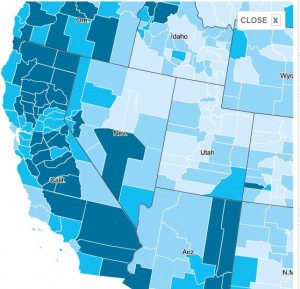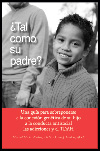Is Your Kid Eating Pizza for Breakfast?
 |
This photo from the New York Times notes the new series Jamie Oliver’s Food Revolution, which addresses nutrition in school lunches. |
If you watched ABC a few Sundays ago, you may have seen the premiere of a new show titled Jamie
Oliver’s Food Revolution. The show follows Jamie Oliver, a British chef known the world over for his healthful cooking, and more notably, for transforming the school lunch program in England into a healthful and budget-conscious success.
His new American reality show took him to Huntington, West Virginia, which, according to data from the Center for Disease Control and Prevention, earned it the moniker by the Associated Press as “Unhealthiest City in America” for 2008. Having no shortage of ambition, Oliver decided to observe and attempt to improve the city’s school lunch program, which served pizza for breakfast each day.
Seeing the state of a school lunch program in the unhealthiest city in America – where more than half of the adult population is considered obese – makes every parent think about what their children eat – and maybe, too, how there own community is faring regarding kids’ weight.
While California cities can’t claim to be the unhealthiest in America, there are disparities with the healthy weight of California children. For example, a smaller percentage of Latino and Pacific Islander children are at a healthy weight compared to their peers in other racial/ethnic groups. Get our most recent data on California students with healthy weight to see how kids in your community compare.
Posted by kidsdata.org
Tags: Child Health Initiatives
Finding Local Data on Substance Use Now Is Easier than Ever
In addition to the compelling drinking and driving data noted in the post below, numerous other substance use indicators also were added to kidsdata.org recently. These data also originated from the California Healthy Kids Survey (CHKS), which was developed and is administered by WestEd for the California Department of Education. Below are a few highlights for the state of California for the 2006-2008 reporting period. See all topics to view these student self-report data for your county or school district.
- 24% of 11th-grade boys and 21% of 11th-grade girls reported binge drinking in the past month before they took the survey.
- More than one-third of 11th-graders in the state report smoking marijuana at least once
- More than one in eight 11th-graders smoked cigarettes at least once in the past month before taking the survey.
- California students in 7th, 9th, and 11th grades are more likely to use alcohol than tobacco or other drugs.
- Students who report feeling less connected to their schools report higher levels of alcohol, tobacco, and other drug use.
For school districts and counties across California, these data are broken down by grade, gender, and students’ feelings of connectedness to their school, making CHKS an essential tool to researchers, policy makers, and those who work directly with kids in assessing how California’s adolescents are faring.
To be notified when these or any other data on kidsdata.org are updated, sign up for e-mail alerts.
Posted by Felicity Simmons
Tags: New Data, Statewide Expansion
How Prevalent Is Drinking and Driving Among Kids in CA? Local Data Provide Clues
Kidsdata.org just added 27 new indicators related to alcohol, tobacco, and other drugs. They all come from the California Healthy Kids Survey (CHKS), through a partnership with WestEd, which developed and administers CHKS for the California Department of Education.
This set of data includes 7th-grade students’ reports of riding in a car with a driver who had been drinking, and reports by 9th and 11th graders of drinking and driving or riding in a car driven by a friend who had been drinking. Here are some state-level findings for 2006-08:
- More than 40% of 7th graders said that they’d ridden in a car with a driver who had been drinking.
- Among 11th graders, girls were slightly more likely than boys to say that they had driven after drinking, or ridden in a car driven by a friend who had been drinking.
- Students with low levels of connection to school were most likely to say they had driven after drinking or ridden with a drinking driver – 14% said they had done so 7 times or more, compared to 6% of students with high levels of connectedness. (School connectedness is a summary measure that includes being treated fairly, feeling close to people, feeling happy, feeling part of school, and feeling safe at school.)
- Asian American students were most likely to report that they had never ridden in a car with a drinking driver or driven after drinking.
Find data for your county or school district:
Reports of Drinking and Driving or Riding with a Driver Who Had Been Drinking, by Grade and Gender
By Level of Connectedness to School
Posted by Sarah Marxer
Tags: New Data, Statewide Expansion
Putting CA’s High Unemployment Rates in a National Perspective
 The Washington Post offers an informative map of unemployment rates, by county, across the United States. On the Post’s map, take note, too, of the “autoplay changes” feature, a helpful visual tool that shows how the recession took hold across America from Jan. 2007 to Nov. 2009.
The Washington Post offers an informative map of unemployment rates, by county, across the United States. On the Post’s map, take note, too, of the “autoplay changes” feature, a helpful visual tool that shows how the recession took hold across America from Jan. 2007 to Nov. 2009.
When you focus on California, you see some troubling signs. From Imperial County through the Inland Empire to the Central Valley and on up to the Oregon border, California’s middle is experiencing among the highest levels of unemployment in the United States. In Imperial County, in fact, the unemployment rate in January 2010 was a shocking 27%, which appears to be among the highest, if not the highest, percentages in the country. The connection between unemployment rates and kids’ well being is perhaps obvious, but this brief paragraph from kidsdata.org makes the point clear:
Not only can unemployment be a barrier to a family’s economic security, it also can place families under stress, affecting children’s emotional health and other aspects of their well being, such as access to health insurance. Children from low-income families are more likely to go hungry; reside in overcrowded or unstable housing; live in unsafe neighborhoods; and receive a poorer education. They also tend to have less access to health care, child care, and other community resources, such as quality after-school programs, sports, and extracurricular opportunities.
Posted by Andy Krackov
Tags: Data Projects
“Underinsurance” Hinders Care for Many Children with Special Needs
The good news is that most of California’s children with special health care needs have health insurance. Unfortunately, that’s only part of the story. For nearly 40 percent of these children, their insurance coverage is inadequate to meet their needs, and low reimbursement policies make it extremely difficult for their families to find physicians and other care providers. As one parent of a special needs child said in a recent article from New America Media (NAM), “I called every therapist from Oakland to San Leandro, but none of them is willing to accept him.”
The NAM article, by Vivian Po, recounts the experiences of several Bay Area families, whose children have diagnoses that include cerebral palsy, Down syndrome, autism, Asperger’s syndrome, and epilepsy. The story highlights how program cuts brought about by California’s staggering budget deficit are worsening the underinsurance problem and taking a toll on families.
The issue is, of course, not limited to California. A national study published online March 8 in the journal Pediatrics notes that adequacy of insurance is strongly related to where a child lives, and that disparities exist within and among states. The authors conclude that legislation guaranteeing insurance for all children is important, but not sufficient. “If policymakers are interested in ensuring equitable treatment in the health care system for children with special health care needs, then policy initiatives aimed at reducing underinsurance and increasing uniformity of coverage across states are also needed,” they write.
A focus area for our foundation is improving the systems of care for kids with special needs, and adequate insurance must be a top priority. See our website at http://www.lpfch.org/informed/cshcn/.
Posted by David Alexander, MD
Tags: CSHCN
Stay Up to Date on Just the Facts That Matter to You
 Kidsdata.org offers a lot of data – likely millions of individual facts about kids in California. But maybe you’re only interested in a few of those facts. A specific ethnic group? A certain city? A couple of different topics?
Kidsdata.org offers a lot of data – likely millions of individual facts about kids in California. But maybe you’re only interested in a few of those facts. A specific ethnic group? A certain city? A couple of different topics?
Now, you can get an e-mail alert when data you care about are updated.
Just launched on kidsdata.org, our free e-alerts notify you whenever data are updated on the topics, regions, and demographic groups you select. These e-mail updates (similar to Google Alerts) can be delivered weekly or monthly and tailored for any combination of data available on kidsdata.org. Learn more>>
Try it out at http://ealerts.lpfch.org.
Posted by Felicity Simmons
Tags: New Features
Families of Children with Special Needs
Bring Concerns to Doorsteps of CA Legislators
![]() Although children with special health care needs account for only 10% of children in California, many of us know of or are affected by a child who is chronically ill. The Family Voices Annual Health Summit and Legislative Day brought together families of chronically ill children for two days of story sharing, education, and rallying at the state Capitol to help raise awareness among lawmakers about this unique population.
Although children with special health care needs account for only 10% of children in California, many of us know of or are affected by a child who is chronically ill. The Family Voices Annual Health Summit and Legislative Day brought together families of chronically ill children for two days of story sharing, education, and rallying at the state Capitol to help raise awareness among lawmakers about this unique population.
On the first day, parents learned about current budgetary and legislative issues affecting their child’s system of care, as well as how to become fierce – yet effective – advocates for their child’s needs. They spoke with each other about their own experiences with insurance companies, pediatricians, school IEPs, and more. Their issues were summed up by one mother who lamented “I’ve been working within this system [of care] for over 20 years, and I’m just now starting to get it … it’s that complicated.” Her story was echoed throughout the day by other parents hoping for an opportunity to share their own story with someone who could help.
After a day of education and preparation, parents went to the Capitol to share their stories with California legislators. Some parents carried envelopes filled with receipts from the myriad of drugs they buy regularly for their child; others toted collages of their children, armed and ready to provide faces to match their stories of struggle. Regardless of their methods, it was clear these parents had one thing in common – they all wanted their voices, and their children’s voices, to be heard by someone with the power to make change happen. This kind of persistent, genuine advocacy is an important component to help legislators understand the impact their everyday decisions have on these children and their families.
Posted by Jordan Handcox
Tags: CSHCN
Advice on Challenging Behaviors
 Dr. Marisol Muñoz-Kiehne, host of the Nuestros Niños radio show for parents, has published a helpful new book, ¿Tal Como Su Padre? The volume advises Spanish-speaking parents on how to observe, understand, and respond to problematic behaviors in their children. Dra. Marisol, a psychologist, discusses childhood issues in Spanish every Sunday morning at 8 a.m. on La Kalle, 100.7 and 105.7 FM, La Nuestra KBBF 89.1 FM, Tricolor KLOK 99.5 FM, Jose KSES 107.1 FM, and KMBX 700 AM. The show is rebroadcast on Fridays at 11 a.m. on KVMR-FM 90.5 and 89.7 FM. For more information, en español, visit www.nuestrosninos.com.
Dr. Marisol Muñoz-Kiehne, host of the Nuestros Niños radio show for parents, has published a helpful new book, ¿Tal Como Su Padre? The volume advises Spanish-speaking parents on how to observe, understand, and respond to problematic behaviors in their children. Dra. Marisol, a psychologist, discusses childhood issues in Spanish every Sunday morning at 8 a.m. on La Kalle, 100.7 and 105.7 FM, La Nuestra KBBF 89.1 FM, Tricolor KLOK 99.5 FM, Jose KSES 107.1 FM, and KMBX 700 AM. The show is rebroadcast on Fridays at 11 a.m. on KVMR-FM 90.5 and 89.7 FM. For more information, en español, visit www.nuestrosninos.com.
Posted by Eileen Walsh
Tags: Child Health Initiatives
Lack of Pediatric Specialists Delays Care, Puts Kids with Special Needs at Risk
Journalist Vivian Po, of New America Media, has written an article that focuses attention on a critical issue for children with special health care needs: long waits to be seen by a pediatric specialist.
Many kids with special needs have multiple medical issues, and require the attention of one or more specialists with expertise in caring for children. California, like the rest of the United States, suffers from a severe lack of these specialists. Last year, the Children’s Specialty Care Coalition, a non-profit association, surveyed the medical directors from nine California medical groups, representing 2,000 pediatric specialists. Results of that survey, released in December, indicated that the waiting time for a specialist is between 16 and 114 days. Children with diabetes, for example, must wait 56 days to see a pediatric endocrinologist, and children with heart conditions wait 39 days before they can see a pediatric cardiologist.
Delaying needed specialty care for children, or forcing them to be seen in emergency rooms, is inadequate medical care, and can put lives at risk. The dearth of pediatric specialists results from several factors, most notably poor reimbursement for physicians who treat children, and extended training requirements that leave young physicians deeply in debt when they begin to practice.
Our foundation is working toward improving the systems of care for kids with special needs, including finding ways to provide more specialty care. See our website at http://www.lpfch.org/informed/cshcn/.
Posted by David Alexander, MD
Tags: CSHCN
California’s Unparalleled Data Offerings
 California may be money-poor these days, but it’s surely data-rich, and that’s got to count for something. After all, is there anywhere else in the country where you can find so many useful data websites focused on the well being of a state and its inhabitants? Today, California’s offerings became even more robust with the launch of HealthyCity, which provides access to numerous local-level datasets and listings of wide-ranging services. Our congratulations to our colleagues at the Advancement Project for making HealthyCity available statewide.
California may be money-poor these days, but it’s surely data-rich, and that’s got to count for something. After all, is there anywhere else in the country where you can find so many useful data websites focused on the well being of a state and its inhabitants? Today, California’s offerings became even more robust with the launch of HealthyCity, which provides access to numerous local-level datasets and listings of wide-ranging services. Our congratulations to our colleagues at the Advancement Project for making HealthyCity available statewide.
Kidsdata.org and HealthyCity have a lot in common, particularly a goal to provide easy access to data and a desire to present these facts in a number of formats, from charts to maps. While our two sites both offer measurements of key indicators, they are inherently different, and undoubtedly will be used in different ways across the state. That’s a good thing. Given the magnitude of California’s problems these days, it’s critical that we have multiple tools to analyze issues and propose solutions. To that end, we’re looking forward to working with HealthyCity to ensure that Californians have a wealth of data at their fingertips. That’s a big first big step toward improving the health of California’s kids.
Posted by Andy Krackov
Tags: Data Projects


